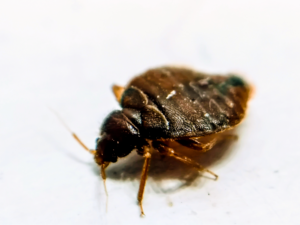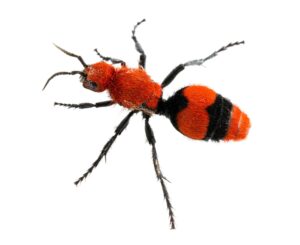Home / Blog / Does Lavender Spray Work for Pests?
Does Lavender Spray Work for Pests?

Scientifically reviewed by Rachel Maldonado
-Published on September 16, 2024
-Updated on December 3, 2025
Ever wish you could chase away pests with the sweet, calming scent of lavender? Join the club!
We’re all looking for eco-friendly, affordable, and non-toxic ways to fight back against household pests. From ants to flies, mosquitoes to moths, there are lots of pests that can allegedly be treated with DIY remedies.
Lavender spray, along with other essential oils, often tops that list – but does it really work?
Why Lavender? The Truth Behind the Buzz
Lavender isn’t just a pretty face in your garden. This purple plant is known for its soothing aroma and medicinal properties. It’s been used for centuries in various cultures for its supposed pest-repelling capabilities.
If you’re wondering how it gained this reputation, it all comes down to lavender’s organic compounds.
The essential oils in lavender contain compounds like linalool and linalyl acetate. Both of these are thought to deter insects. We might love how lavender smells, but bugs don’t!
One common method for using lavender is through the application of lavender essential oil. It can be diluted with water and used as a spray around the home, particularly in areas prone to pest infestations.
Dried lavender can also be placed in sachets and stored in closets or drawers to repel moths and other clothing pests.
What Pests Can Lavender Be Used For?

Lavender spray is often touted as a remedy against several common household pests, including:
Mosquitoes
Mosquitoes are the bane of summertime fun. They’re attracted to human skin and sweat, and their bites can be incredibly irritating. Lavender’s pleasant scent is believed to mask the odors that attract mosquitoes, making it harder for them to find you.
Studies have found that while lavender may be able to reduce mosquito bites, it’s not as effective as DEET, the gold standard in mosquito repellents. While lavender may offer some protection, it’s not a foolproof solution.
Moths
Moths might not bite, but they can ruin your favorite clothes. Lavender sachets are often placed in closets and drawers to keep moths at bay, thanks to their strong scent.
Research on lavender’s effect on moths is more promising. Lavender oil has been shown to deter adult clothes moths, but its effectiveness can diminish over time. For long-term protection, regular reapplication is necessary.
Flies
Flies are more than just irritating. They can also carry diseases – which means getting rid of them is imperative.
Some people swear by lavender spray as a fly repellent, claiming it keeps these pesky insects away from food and living spaces.
Scientific evidence on lavender as a fly repellent is, unfortunately, quite sparse.
Ants
Ants can be particularly hard to get rid of once they invade your home. Lavender spray is sometimes used to disrupt their scent trails, making it difficult for them to find their way back to food sources.
There’s little scientific research specifically on lavender and ants. Essential oils like lavender can disrupt scent trails, making it a potential short-term solution, but don’t expect it to eliminate an entire ant colony. It’s probably a temporary Band-Aid at best.
The Benefits and Downsides of Using Lavender Spray
Despite mixed reviews, lavender spray does offer some advantages over traditional pest control methods:
- Non-Toxic: Unlike chemical pesticides, lavender oil doesn’t pose a risk to humans, pets, or the environment.
- Pleasant Scent: Most pest control products don’t smell great. Lavender spray, on the other hand, leaves your home smelling fresh and inviting.
- Easy to Make: Lavender spray is simple to make and apply. Just mix a few drops of lavender essential oil with water in a spray bottle, and you’re good to go.
But it’s not without its downsides:
- Not a Guaranteed Solution: Lavender spray isn’t a guaranteed solution for all pests. It may offer some relief, but it’s not a substitute for professional pest control.
- Regular Reapplication Needed: To maintain its effectiveness, lavender spray needs to be reapplied regularly. This can quickly get time-consuming and tedious.
- Potential Allergies: While rare, some people may be allergic to lavender. Always test a small area before widespread use to avoid adverse reactions.
The Verdict: Should You Use Lavender Spray for Pests?
Lavender spray can be a useful part of your pest control arsenal – however, you shouldn’t view it as a one-size-fits-all solution. For minor pest problems, it may offer some relief, especially when it comes to preventing (versus removing) pests. However, for more serious infestations, professional pest control is always going to be your best bet.
At Hawx Pest Control, we take a comprehensive approach to pest management. We get to the root cause of the pest problem and don’t apply blanket solutions – we make sure it’s tailored to your unique problem.
For us, pest control isn’t a one-time job. We offer ongoing support and maintenance to keep your home pest-free year-round.
When it comes to pest control, why settle for anything less than the best? Join our family of satisfied customers and experience the Hawx difference.
Related Articles
Visit our blog to learn more.
→





